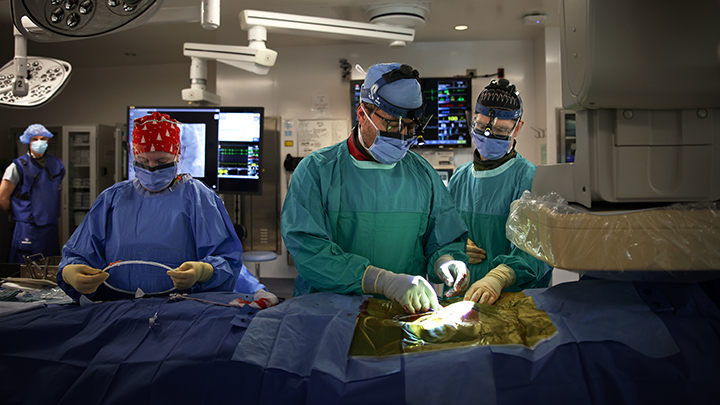
February 6, 2023

Dr. Derek Exner, centre, a cardiologist and associate dean at the University of Calgary, implants an Aveir leadless pacemaker in a patient at the Foothills Medical Centre. Health Canada recently approved the advanced device after a successful eight-year clinical trial. Photo by Leah Hennel.
Story by Blain Fairbairn | Photo by Leah Hennel
CALGARY — As a seven-time Iron Man competitor, veteran marathoner and avid swimmer, Gord Kirk, 68, is keenly attuned to the nuances of his cardiovascular health. So when his heart began beating irregularly in the late 1980s, he naturally felt concerned about how it would impact his highly-active lifestyle.
After being referred to a cardiologist at Foothills Medical Centre (FMC), Kirk would be diagnosed with a heart arrythmia, a medical condition in which electrical signals that coordinate the heart's beats don't work properly. In Kirk’s case it was bradycardia, when the heart beats too slowly.
“If my resting heart rate fell below 40 (beats per minute), I would feel faint, and sometimes I did pass out,” Kirk says. “I would have to be careful getting up out of a chair or standing up too quickly if my heart rate was too low.”
By 2021, Kirk was preparing to have a pacemaker implanted to help regulate his heartbeat. It was purely by chance that Dr. Derek Exner, a cardiologist at FMC and associate dean, clinical trials, at the University of Calgary’s Cumming School of Medicine, came across his case and offered Kirk a new, cutting-edge pacemaker with no wires or bulky components.
“(Dr. Exner) said I was a candidate for a clinical trial. When he explained the device to me and what it offered, I saw only upside,” adds Kirk. “I didn’t even know there was such a thing as a leadless pacemaker.”
That February, Dr. Exner implanted an Aveir leadless pacemaker directly into Kirk’s heart. Slightly smaller than an AAA battery, the AVEIR leadless pacemaker offers several advantages over traditional pacemakers: it has a very long battery life averaging more than 15 years; it’s less invasive, requiring only a small incision in the groin to guide it into the right lower heart chamber; and it’s also easier to remove and replace.
“One of the truly amazing things is, patients forget they have a pacemaker,” says Exner. “That’s really rewarding, taking the device from a place where it’s an inconvenience or a nuisance to a place where they forget they have it,” he says.
After working with Aveir manufacturer Abbott Laboratories on a clinical trial of the pacemaker’s safety and efficacy over the past eight years, a major milestone was achieved with Health Canada’s recent approval of the device.
“The approval is a national game-changer for improved cardiovascular care,” he says. “It allows for Canadians to receive the best technology in the world and have a better quality of life with their pacemaker.”
Exner is helping expand the device’s use by developing a training program for physicians to learn how to implant it. FMC will become a training centre regionally and internationally, leading to the potential for early access for Albertans.
For Kirk, having the Aveir pacemaker means he can return his focus to staying healthy, rather than worrying about feeling unwell.
“It’s kinda boring actually,” he says. “It’s been great and I don’t feel any of the symptoms I used to — the lightheaded spells and dizziness.
“It’s just back to normal. I go days without even thinking about it.”
February is Heart Month, an opportune time to raise awareness of the importance of cardiovascular health, and how to reduce the risk of cardiovascular disease. Heart disease affects approximately 2.4 million Canadian adults and is the second-leading cause of death in Canada. More than 200,000 Canadians are currently living with pacemakers.
Learn more about heart health at MyHealth.Alberta.ca.